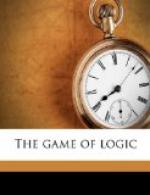And now what am I driving at, in all this long rigmarole? It is this. You may put “is” or “are” between names of two things (for example, “some Pigs are fat Animals"), or between the names of two attributes (for example, “pink is light-red"), and in each case it will make good sense. But, if you put “is” or “are” between the name of a thing and the name of an attribute (for example, “some Pigs are pink"), you do not make good sense (for how can a Thing be an Attribute?) unless you have an understanding with the person to whom you are speaking. And the simplest understanding would, I think, be this—that the Substantive shall be supposed to be repeated at the end of the sentence, so that the sentence, if written out in full, would be “some Pigs are pink (Pigs)”. And now the word “are” makes quite good sense.
Thus, in order to make good sense of the Proposition “some new Cakes are nice”, we must suppose it to be written out in full, in the form “some new Cakes are nice (Cakes)”. Now this contains two ’terms’—“new Cakes” being one of them, and “nice (Cakes)” the other. “New Cakes,” being the one we are talking about, is called the ‘subject’ of the Proposition, and “nice (Cakes)” the ‘predicate’. Also this Proposition is said to be a ‘particular’ one, since it does not speak of the whole of its Subject, but only of a part of it. The other two kinds are said to be ‘Universal’, because they speak of the whole of their Subjects—the one denying niceness, and the other asserting it, of the whole class of “new Cakes”. Lastly, if you would like to have a definition of the word ‘proposition’ itself, you may take this:—“a sentence stating that some, or none, or all, of the Things belonging to a certain class, called its ‘Subject’, are also Things belonging to a certain other class, called its ‘Predicate’”.
You will find these seven words—proposition, attribute, term, subject, predicate, particular, Universal—charmingly useful, if any friend should happen to ask if you have ever studied Logic. Mind you bring all seven words into your answer, and you friend will go away deeply impressed—’a sadder and a wiser man’.
Now please to look at the smaller Diagram on the Board, and suppose it to be a cupboard, intended for all the Cakes in the world (it would have to be a good large one, of course). And let us suppose all the new ones to be put into the upper half (marked ’x’), and all the rest (that is, the not-new ones) into the lower half (marked ’x’’). Thus the lower half would contain elderly Cakes, aged Cakes, Ante-DILUVIAN Cakes—if there are any: I haven’t seen many, myself—and so on. Let us also suppose all the nice Cakes to be put into the left-hand half (marked ’y’), and all the rest (that is, the not-nice ones) into the right-hand half (marked ’y’’). At present, then, we must understand x to mean “new”, x’ “not-new”, y “nice”, and y’ “not-nice.”




